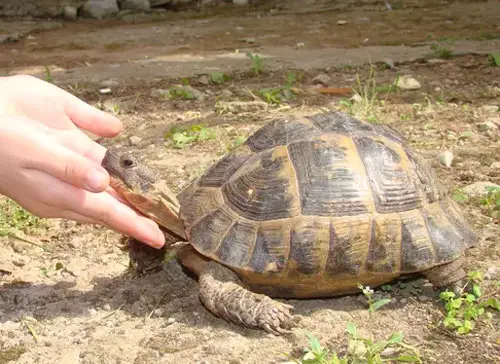Turtle Shell Broken And Bleeding? Here’s How To Help
It can be very disheartening to discover your pet turtle’s shell is broken. It could be because an animal attacked the turtle or an accident occurred. Don’t worry because you can repair a broken turtle shell.
Are you worried because your turtle shell broken and bleeding? You can repair a minor crack on a shell through plastic or fiberglass. If the gap is extensive, take the turtle to a vet that handles exotic animals. It could be hazardous if your turtle’s shell is broken and bleeding. So don’t hesitate to take it to a vet.
It is up to you to decide whether you can manage the crack at home or if you want to take the turtle to a vet. In this article, we will discuss the reasons and how to help if a turtle gets its shell broken.
How To Help A Turtle With A Broken Shell?
Contents
Here is how to deal with a broken turtle shell.

Examine the extent of the crack
The extent of the crack can be minor or very extensive, and you might notice the shell is missing some of its pieces. So, if it is minor damage, you can perform first aid before taking the turtle to a vet. However, if it is a large crack, take the turtle to the wildlife rehabber or a reptile specialist immediately.
The difference between a minor crack and a major one is in a significant crack, you will see bone, and the turtle will be bleeding. In such a case, you should not do anything to the turtle; just take it to a vet.
The vet will examine the extent of the crack. They may have to rebuild the whole shell using fiberglass or resin if it is severely broken. In some cases, euthanasia is administered by vets if there is no chance of recovery.
Home-based care is essential because even minor cracks can mean that your pet turtle’s internal organs are damaged. In extreme cases, your turtle’s shell could cave in and pierce the turtle’s inner tissues. This could expose the turtle to a risk of infection, such as sepsis.
If it’s a wild turtle and it is injured, take it to the nearest wildlife rescue, reptile rescue, or turtle rescue.
Disinfect the wound
If the damage is minor, you can attend to your pet turtle. However, take preventive measures such as wearing gloves because turtles may get aggressive when in pain.
The next step is to disinfect the wound. You can clean the wound using diluted iodine. Clean the wound severely. This makes the injury free of debris, dirt, and bacteria. Also, a clean wound means the shell will not rot. After cleaning the wound, cover it with a clean cloth.
Dry the shell
If you have an aquatic turtle, keep it away from water until the wound heals. Water can make the injury have bacteria and germs. Keep the turtle in a cool area, not a hot room.
Consider medications
As we said earlier, in case your box turtle has more extensive wounds, ensure you take it to a reptile specialist. There, the specialist will examine the extent of the injury and administer medications for at least a week.

Antibiotics help to heal significant infections. An example of an antibiotic is ceftazidime. The specialists can also give you creams or ointments on the wound. Remember to keep your turtle in a dirt-free zone and wrap its wound with a cloth or bandage.
In case of large cracks
Large cracks should be left to get specialist treatment. The veterinarian will repair the shell once the wound has healed. There are several ways of fixing a turtle’s shell based on the size and extent of the crack. They include;
- Resin
- Fiberglass
- Plastic or metal
- Zip Ties, bra clasps, or wires
- Dental composite
The specialist may use zip ties if the split is not that large. They will lay zip ties on top of the shell to ensure the parts do not move, which makes them attach back together.
Using fiberglass or resin
When using fiberglass, specialists apply it on top of the crack. They use coats of glue to stick the fiberglass patch on the shell.
Afterward, ensure you place your turtle in a dry, dust-free area where no particles can stick to the shell. If it is an aquatic turtle, it is best not to use fiberglass because water will make the glue loosen up.
When the glue has dried, apply resin to ensure the fiberglass and shell remain in place. Before using any parchment, ensure the wound is completely healed, so you do not seal any infection. Also, be careful not to drip any glue into the wounded area.
Using a metal or plastic brackets
After some time, veterinarians realized that fiberglass application led to more soft tissue infection. So, they changed to using plastic brackets and dental composite. Dental composite can come into contact with the soft tissues without causing infections.
They are also long-lasting and practically waterproof. This means no bacteria can enter to contaminate the inner wounds. The bridging method also comes in handy because it needs to be immobile for the shell to reattach.
Drying the glued shell
Before putting your turtle back into its standard enclosure, ensure the glue is dry. Specialists recommend turtles dry for up to a week, especially if an aquatic turtle needs to get back in the water.
Common Reasons That Can Result In a Broken Shell
Here are some of the reasons that can result in a broken shell.

Also read: Can You Put Fish In A Turtle Tank?
Attacks from other animals
An animal attacking your turtle could lead to a broken turtle shell—for example, a dog. If you own a dog and a turtle, ensure they do not share the same space. Dogs may confuse your pet turtle for a toy or prey and bite it.
Dog teeth are powerful, which helps them break bones when eating meat. So, they can also pierce the strong exoskeleton. An animal bite can cause extensive damage to the turtle’s shell.
Falling from the cage
If your turtle is not comfortable in its environment, it might try to escape. When climbing out of the cage, the turtle might fall off and injure itself. This is especially common if the cage is in a high place.

Accidents
Even though turtle shells are pretty robust, a vehicle is far more powerful. Pet turtles are not susceptible to car accidents, but a wild turtle crossing the road may not be lucky.
You should take an injured wild turtle, put it in a cool area away from the noise and contact a nearby turtle rescue.
Also, if you or a child is carrying the turtle, they might accidentally drop them. Because the turtle is fighting out of their hands or because they lack the strength to hold the turtle.
Fighting each other
Turtles are very solitary creatures. So they can become highly aggressive about their territories. They might push each other into hard surfaces if they fight, making their shells crack.
How Long Does A Turtle Shell Take To Heal?
It depends on the extent of the injury. If it is a minor injury, it can take months to heal. A large crack can take even years.
Remember to attend to your injured turtle, so it feels cozy and comfortable. Clean its wounds and bandage them as told by the veterinarian.

If you own a baby turtle, the fiberglass must be reapplied. Why? Because as turtles grow, so do their shells. This means the fiberglass needs to be exchanged with a larger parchment.
Video Of Turtle With A Broken Shell
Here is a video of a vet handling a turtle with a broken shell.
Related Questions
Here are other frequently asked questions.
Yes, a turtle can live with a broken shell. If given enough care, the turtle’s shell will heal up on its own. However, if the surface is severely damaged, the turtle might not survive. This is because the shell is a large part of the turtle’s existence. A broken shell means there is a chance of internal injuries.
If your turtle’s shell is bleeding, immediately take it to a specialist. Bleeding means the injury is severe and needs a qualified veterinarian. If you cannot get to the vet, stop the bleeding, clean the wound and bandage it up. Continue with the process until you can get a specialist.
Related: Why Is My Turtle Always Hungry?
Conclusion
Handling a turtle with a broken shell is always saddening, but the turtle needs immediate care. The turtle will survive a broken shell when the wound is cleaned and kept out of dirt and bacteria.
For an aquatic turtle, let it stay out of the water until the wound is healed. If the turtle’s shell is severely damaged, do not take matters into your own hands; take it to a vet.
Fiberglass, resin, dental composite, and plastic brackets are all ways to fix a broken shell. We hope this article helped you understand what to do to help an injured turtle.


